The International Solar Alliance is initiating the project known as the "Green Grids Initiative". It was initiated by India and France at 2015 Paris climate conference to promote sun energy. In May 2015, India and the U.K. agreed to collaborate in this initiative.
While solar energy is cheaper than the dirtier options, it cannot be relied upon overnight. Countries must rely on fossil fuels which produce greenhouse gases and earth-warming carbon dioxide. This is particularly true in India, which has a high demand for power.
According to Ajay Mathur (director general of the International Solar Alliance), the new project is based upon the notion that the sun shines in every part of the globe. The project will create a global grid to transfer the sun's energy from one place to the next.
"For instance, even though it is dark in East Asia, it is still light in India when it gets dark." He said that if there were a cable connecting India and East Asia, then solar electricity could be delivered to east Asia."
Although the idea of a grid that spans regions is not new in itself, this is the first attempt at creating a global network. Experts see the project as India's counterweight to China's Belt and Road infrastructure initiative.
Mathur stated that estimates show that solar power will be as cheap as fossil fuel power within the next three-years. This will make it easier for new plants to be built and more storage facilities. It will still be difficult for countries with different priorities and interests to come up with complex agreements.
He said that the project would begin with a "coalition for the willing", which is two countries that would benefit from solar electricity transfer. The countries involved would have to decide how interconnection should work and what regulations would be in place.
He stated that "the number of willing nations will continue to increase over time, as cost decreases and certainties become greater,"
Mathur stated that investors should be sure that their investments are safe and that they will get a good return. However, it is also important to ensure that electricity generated will be cost-effective.
He said that the International Solar Alliance had hoped to sign an agreement with the Global Energy Alliance. This group includes multilaterals like the World Bank and philanthropy organisations. It would create a fund of $10 billion for the project and mitigate risk.
He said, "So we create projects, then we give it to them and they help...make these projects safe enough for international investors to come in,"
A potential problem is if the route between two countries is blocked, such as if they aren't stable. Other cases would require a longer cable, or one that runs beneath the ocean. These factors can all lead to a sharp increase in costs.
Mathur stated that even with a "fairly aggressive timeline", the first projects linking different regional grids will still take "one year." This is because countries must first be convinced of this concept, then work together to find the best way to build it.
Date Of Update: 31 October 2021, 14:07










